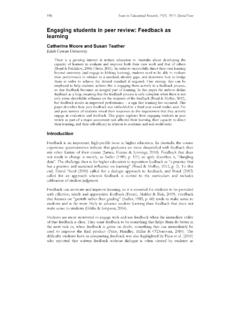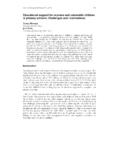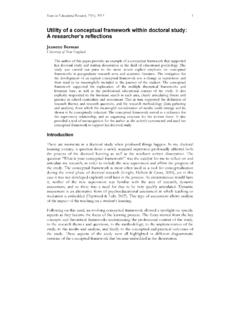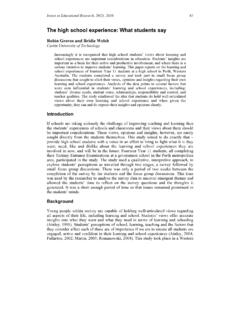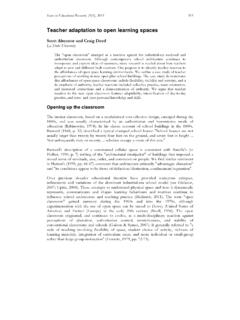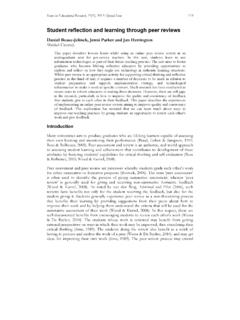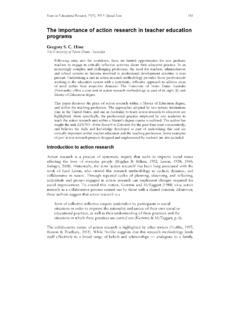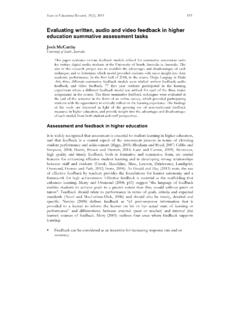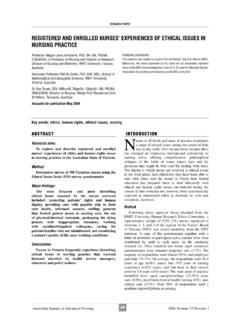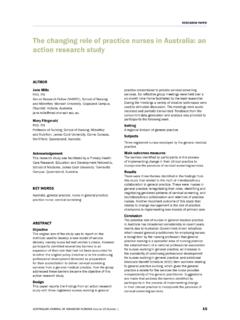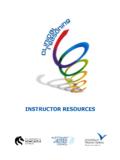Transcription of Comparing clinical competencies between nursing …
1 Issues in Educational Research, 18(1), 200890 Comparing clinical competencies between nursingstudents with degrees and traditional studentsP. Renee Williams, Jean T. Walker, Tina Martin, LaDonna Northington,Patricia Waltman, Tracilia Beacham and LaVerne GrantUniversity of MississippiNursing students with second degrees have become the focus of great interest in the lasttwo decades in terms of being an answer to the nursing shortage. They are thought topossess greater ability to critically think and engage in self directed learning behaviours,and possess greater motivation to master clinical skills. The purpose of this study is tocompare differences in students perception of clinical competency between BSNstudents with a baccalaureate degree and BSN students without a previous degree. Thesample consisted of 134 undergraduate junior and senior nursing students enrolled in atraditional baccalaureate program in a large metropolitan university.
2 The results yieldedstatistically significant differences on two of the 36 competency measures. Second degreestudents indeed are different in maintaining client confidentiality and developingappropriate, prioritised nursing diagnosis. Therefore, this study supports that seconddegree nursing students have greater clinical competency in professional behaviours ofclient confidentiality and critical thinking with nursing diagnosis. Interestingly, the studydid not support second degree students as superior in mastering 17 basic nursing students with first degrees in another discipline have become the focus of greatinterest in the last two decades as an answer to the nursing shortage. As a result,Accelerated Bachelor of Science in nursing (BSN) programs gained momentum acrossthe nation and in 2006 the American Association of Colleges of nursing (AACN)reported a total of 191 accelerated baccalaureate programs with numerous programs indevelopment (AACN, 2006).
3 The impetus behind this surge in accelerated programs is the belief that studentsundertaking second degrees are more mature; goal oriented, and have greater capacity forcritical thinking and learning. They are considered to have already demonstratedintellectual and academic capacity and have obtained a sound knowledge base of the artsand humanities (AACN, 2006; Shiber, 2003; Seldomridge & DiBartolo, 2005).The minimal anecdotal literature that exists regarding second-degree students suggests thatthese students enter nursing education as adult learners with rich background experiences,greater ability to critically think, self directed learning behaviours, and possess greatermotivation to master clinical skills. The literature also supports second degree students asadult learners who possess greater maturity, motivation, and engagement for learning(AACN, 2006; Shiber, 2003).
4 Furthermore, second-degree students are thought to moreaggressively pursue evidence-based clinical problem solving in the educational process(Vinal & Whitman, 1994; Renaud & Miller, 2003; Shiber, 2003).Williams, Walker, Martin, Northington, Waltman, Beacham & Grant91In light of the tremendous increase in accelerated nursing programs with graduatestudents targeted for enrollment, there remains very little empirical evidence that pertainsto accelerated program outcomes or second degree student outcomes regarding clinicalcompetency or effective clinical practice. Interestingly, the preponderance of publishedstudies and anecdotal literature that does exist pertains mainly to nursing education. Thediscipline of nursing certainly has captured the population of students with previousbaccalaureate degrees in other fields as viable sources to enhance the profession andalleviate the shortage of professionals order to empirically validate the unique differences of second degree students , thecurrent study seeks to explore clinical outcomes and competency measures regardingsecond degree students .
5 The study is conducted within a traditional baccalaureate nursingcurriculum and seeks to determine the differences in clinical competency characteristicsbetween students with a previous baccalaureate degree and those without a previousdegree. This research is important because of the sheer lack of empirical evidenceregarding the propensity of second-degree students being suitable for accelerated seconddegree programs and for determining if they truly possess enhanced clinical and Whitt (2005) also concluded that limited research has been conducted intosecond degree students outcomes. The authors state that the majority of existing researchonly includes state board examination pass rates, employer satisfaction, job positions, andsecond degree curriculum development. There is little to no research available on theefficacy of second degree programs, student outcomes, or clinical , determining if second degree nursing students differ from their traditionalcounterparts in terms of clinical competency is purpose of this exploratory study is to compare differences in students perception ofclinical competency between BSN students with a previous baccalaureate degree and BSNstudents without a previous degree.
6 This comparison includes differences such as intrinsicmotivation, self-efficacy, and confidence that are self-reported, as well as clinicalcompetency measures of basic nursing reviewClinical competencyExtensive nursing literature exists regarding the difficulty of defining or describing clinicalcompetency and has resulted in a plethora of assessment tools with little empiricalevidence to support the competency based approach to nursing education (Dolan, 2003;Ramritu & Barnard, 2001; Lofmark, Smide, & Wikbald, 2006). This difficulty provides amajor challenge for nursing education to continue to pursue methods of measuringclinical competencies for all nursing students . This is particularly important for acceleratedsecond degree programs that embrace second degree students as more qualified or moreadaptable to fast-track curricula.
7 This creates the need to provide empirical evidence of92 Comparing clinical competencies between students doing second degrees and traditional studentsefficacy and competence in second degree student and program outcomes in order toestablish credibility for this. This evidence may provide further insight regarding whatother student populations may be suitable for accelerated nursing curricula or acceleratedcurriculums in other health care disciplines. The following section represents significantresearch to date regarding second degree degree studentsVinal and Whitman (1994) addressed teaching methodologies for second degreebaccalaureate students . The authors reported that second degree students possess asignificantly greater desire for clinical competence than traditional baccalaureate , they concluded that second degree students devote extensive preparation time toobtaining clinical competency and focusing on essential elements of and DiBartolo (2005) conducted a study with 71 accelerated second degreeBSN students to determine how they differed from traditional baccalaureate students indemographic and academic characteristics.
8 The results of the study indicated no statisticaldifferences between the two groups. The second degree students had only slightly higherlicensure pass rates, grade point average at graduation, and higher standardised course andcurricular test sources. The authors did not address clinical competency measures of thesubjects. However, the study supports the theory that second degree students generallyperform better academically than traditional baccalaureate students (Seldomridge &DiBartolo, 2005).There has been no research published to date regarding clinical competency measures forsecond degree students in nursing , either in the academic or work place setting. The samebarriers for accurately measuring clinical competence for nursing in general may have arole in why this has occurred. The following study represents some of the difficulty inobtaining competency assessments of new graduates and has implications for the , Smide & Wikblad (2006) studied perceptions of clinical competence of newgraduate nurses both from the experienced nurses and nursing graduates study was conducted in Sweden with 106 nursing students from a variety of academicprograms and 136 registered nurses with more than 5 years experience.
9 Each subjectcompleted a questionnaire to determine competence defined as learning outcomes and theability to perform nursing care of the new graduate nurse. The results of the studyindicated that new graduate nurses had statistically significant stronger ratings of theircompetence and clinical abilities than the experienced nurses had of the new graduatenurse s competence and clinical abilities. This study did not include specific measures ofclinical competence in nursing care, only perceptions of competence. However, thefindings are important in terms of understanding students ability to accurately measure orgauge their own clinical competency (Lofmark, Smide & Wikblad, 2006). The followingstudy attempted to explore this , Walker, Martin, Northington, Waltman, Beacham & Grant93 Ramritu and Barnard (2001) conducted a phenomenography study in Australia to describenew nurse graduates conception and understanding of clinical competence.
10 Six new nursegraduates were interviewed for the study and were asked to describe and draw what theyperceived to be competence in eight competency domains. These domains included safepractice, limited independence, utilisation of resources, time management and workload,ethical practice, clinical skills, knowledge, and evolving. The findings of the study yielded adistinction between competences in capability as a different entity from competency inperformance. Capability competence is considered a forerunner for performancecompetency in clinical settings. Therefore, new graduates have greater competencecapacity and performance if they have on-going, supportive educational experiencesthrough the transition from student to clinician (Ramritu & Barnard, 2001).In a similar study in Iran, Memarian, Salsali, Vanaki, Ahmadi, & Hajizadeh (2007),conducted grounded theory research to determine factors of professional ethics in clinicalcompetency for nursing .
